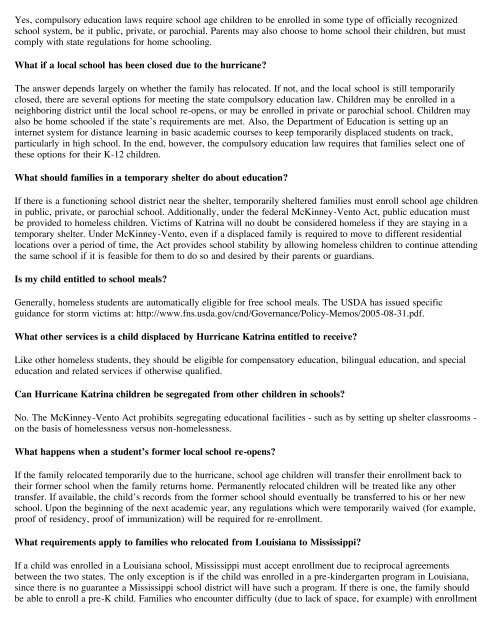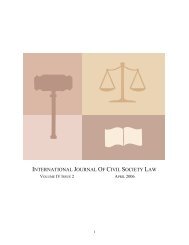Hurricane Katrina: Legal Issues - Columbus School of Law
Hurricane Katrina: Legal Issues - Columbus School of Law
Hurricane Katrina: Legal Issues - Columbus School of Law
Create successful ePaper yourself
Turn your PDF publications into a flip-book with our unique Google optimized e-Paper software.
Yes, compulsory education laws require school age children to be enrolled in some type <strong>of</strong> <strong>of</strong>ficially recognized<br />
school system, be it public, private, or parochial. Parents may also choose to home school their children, but must<br />
comply with state regulations for home schooling.<br />
What if a local school has been closed due to the hurricane?<br />
The answer depends largely on whether the family has relocated. If not, and the local school is still temporarily<br />
closed, there are several options for meeting the state compulsory education law. Children may be enrolled in a<br />
neighboring district until the local school re-opens, or may be enrolled in private or parochial school. Children may<br />
also be home schooled if the state’s requirements are met. Also, the Department <strong>of</strong> Education is setting up an<br />
internet system for distance learning in basic academic courses to keep temporarily displaced students on track,<br />
particularly in high school. In the end, however, the compulsory education law requires that families select one <strong>of</strong><br />
these options for their K-12 children.<br />
What should families in a temporary shelter do about education?<br />
If there is a functioning school district near the shelter, temporarily sheltered families must enroll school age children<br />
in public, private, or parochial school. Additionally, under the federal McKinney-Vento Act, public education must<br />
be provided to homeless children. Victims <strong>of</strong> <strong>Katrina</strong> will no doubt be considered homeless if they are staying in a<br />
temporary shelter. Under McKinney-Vento, even if a displaced family is required to move to different residential<br />
locations over a period <strong>of</strong> time, the Act provides school stability by allowing homeless children to continue attending<br />
the same school if it is feasible for them to do so and desired by their parents or guardians.<br />
Is my child entitled to school meals?<br />
Generally, homeless students are automatically eligible for free school meals. The USDA has issued specific<br />
guidance for storm victims at: http://www.fns.usda.gov/cnd/Governance/Policy-Memos/2005-08-31.pdf.<br />
What other services is a child displaced by <strong>Hurricane</strong> <strong>Katrina</strong> entitled to receive?<br />
Like other homeless students, they should be eligible for compensatory education, bilingual education, and special<br />
education and related services if otherwise qualified.<br />
Can <strong>Hurricane</strong> <strong>Katrina</strong> children be segregated from other children in schools?<br />
No. The McKinney-Vento Act prohibits segregating educational facilities - such as by setting up shelter classrooms -<br />
on the basis <strong>of</strong> homelessness versus non-homelessness.<br />
What happens when a student’s former local school re-opens?<br />
If the family relocated temporarily due to the hurricane, school age children will transfer their enrollment back to<br />
their former school when the family returns home. Permanently relocated children will be treated like any other<br />
transfer. If available, the child’s records from the former school should eventually be transferred to his or her new<br />
school. Upon the beginning <strong>of</strong> the next academic year, any regulations which were temporarily waived (for example,<br />
pro<strong>of</strong> <strong>of</strong> residency, pro<strong>of</strong> <strong>of</strong> immunization) will be required for re-enrollment.<br />
What requirements apply to families who relocated from Louisiana to Mississippi?<br />
If a child was enrolled in a Louisiana school, Mississippi must accept enrollment due to reciprocal agreements<br />
between the two states. The only exception is if the child was enrolled in a pre-kindergarten program in Louisiana,<br />
since there is no guarantee a Mississippi school district will have such a program. If there is one, the family should<br />
be able to enroll a pre-K child. Families who encounter difficulty (due to lack <strong>of</strong> space, for example) with enrollment

















